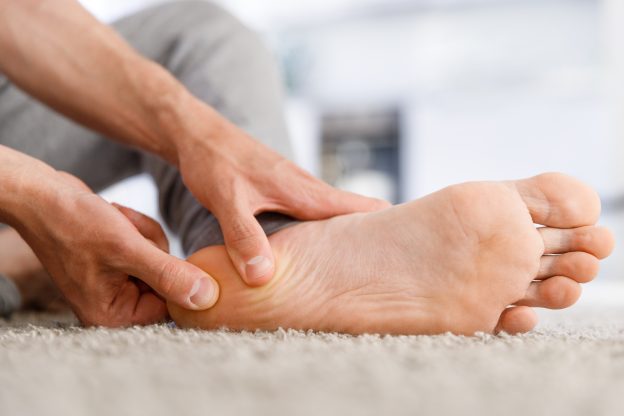What is Plantar Fasciitis? Plantar Fasciitis, also known as heel spur deformity, is a painful medical condition affecting people from all walks of existence. From the weekend warrior to the professional athlete, and everywhere else in-between, this painful medical condition can be extremely painful. While, there is no cure for the condition, there are some things you can do to relieve the symptoms and discomfort.
Treatments for Plantar Fasciitis include, rest, therapy and shock wave therapy. Rest is the easiest way to treat the condition, especially when your symptoms are minor. It does not prevent further damage if you do not have proper resting, so it is important to seek advice from your local sunshine coast podiatrist on when to take rest. It is always best to consult a physician to get a proper diagnosis, but the rest is an excellent way to ease Plantar Fasciitis symptoms. While therapy has been proven to work well for milder cases, it is generally considered one of the last resorts for more severe cases.
Shock Wave Therapy is probably one of the oldest forms of home treatment for Plantar Fasciitis. The principle behind shock waves is based on the theory that when certain body systems are shocked, they release chemicals that decrease inflammation and thus reduce pain. This principle has been studied over the years with great results. However, there is no evidence that applying high-frequency sound waves will increase healing speed. Therefore, it should not be considered a first choice for home treatment of plantar fasciitis.
Another method of treatment is by applying essential oils to the heel and/or arch of the foot. Essential oils have been shown to have anti-inflammatory and pain-relieving properties, but like shock waves, they may not increase healing speed in most cases. Be careful about over-using essential oils and don’t forget to consult your physician before doing so.
If your podiatrist finds that you do need medication for Plantar Fasciitis, he may recommend the use of non-steroidal anti-inflammatory medications (NSAIDs). These medications are not without side effects, however. They can cause gastrointestinal upset, bleeding, and stomach ulceration, which may result in the need for additional medication. Steroid injections are also not recommended for plantar fasciitis treatment since steroid injections may lead to the stiffening and thickening of the fascia, which may lead to further symptoms.
Stretching is another important home treatment for Plantar Fasciitis. Since Plantar Fasciitis often develops when there is excessive pressure on the heel (as when a runner is walking or running), the best way to relieve this pressure is by stretching. The key is to start gently and to stretch gradually. Begin with ten minutes of gentle stretching, and increase the amount of time as needed until you feel that the pain is being reduced. Many runners find that ten minutes of brisk walking provides enough relief to allow them to complete a full leg workout without experiencing the pain and inflammation that usually occur during or after a strenuous workout.
If you’re taking prescription medications for plantar fasciitis, you may be able to reduce the inflammation and therefore the pain by using essential oils. Tea tree oil and menthol oil are two popular essential oils that may help reduce inflammation. You should dilute these oils with a carrier oil such as grapeseed oil or olive oil before applying them to the affected area. Essential oils can have a calming effect on the body and have been found to be helpful in relieving the discomfort associated with Plantar Fasciitis.
Many people ignore pain and only seek medical attention when they have exhausted all other possible methods at their disposal. A visit to your doctor may indicate that the treatment that you are trying to use isn’t working. He may suggest that you lose weight or prescribe anti-inflammatory medication. In some cases, your doctor may recommend that you remove the offending footwear (often the case with plantar fasciitis). If the symptoms persist, a specialist should be consulted.
